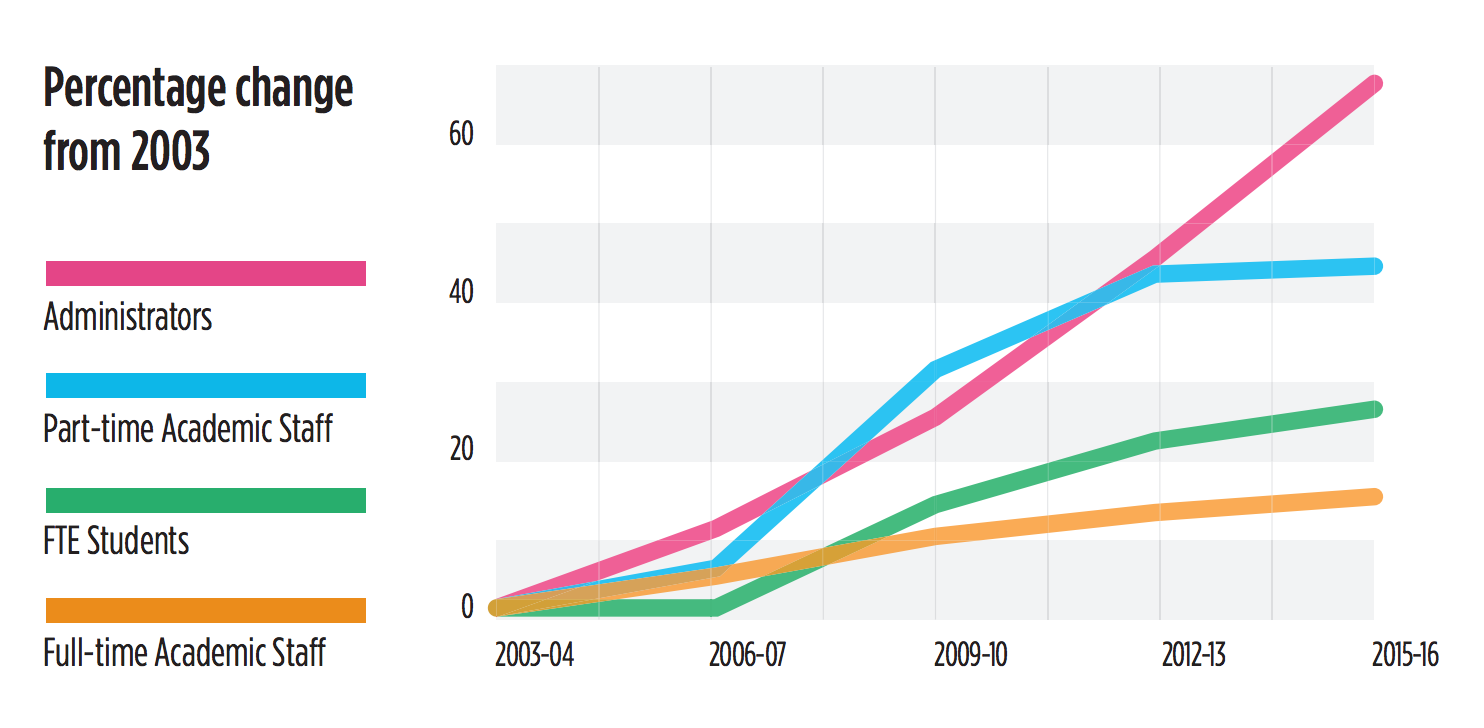The key issues have been presented very clearly by our bargaining team, but it always helps to take a look at the issues from a local perspective.
Issue 1: Students and Faculty First – This issue is really about the systematic over-reliance on non-full-time faculty, their unfair employment terms, and the effect this has on education quality. System-wide, the last 15 years has seen the growth in contract faculty far outpace the growth of full-time faculty. The CAAT-A team is reporting that currently over 80% of the teaching at Ontario colleges is now done by contract faculty.
What about at Northern?
Northern College has followed this trend. The number of full-time faculty has been on a steady decline. We now sit at 72 full-time faculty members – a decline of about 12 full-time positions (-14%) in the last 10 years. While we do not have enough historical data on contract faculty numbers to make comparisons, we can report that last semester we had 152 individuals who taught at Northern College on a contract, so well over a 2:1 ratio of contract faculty to full-time. In terms of hours, contract faculty taught a total of 17550 hours last semester. If we divide that into a 15 week semester, that’s 1170 hours per week, which would be the equivalent of about 80 full time faculty positions. So in total, well over 50% of the contact hours with students at Northern College are staffed by contract faculty. Whether you measure by number of employees or number of hours, our students, like those across the system, spend more time with contract faculty than they do with full-time faculty.
What’s the problem?
Simply put, the current situation is unfair to faculty and students and threatens education quality across the system. The average contract faculty compensation for the equivalent of a full-time teaching load is less than $30,000. Most contract faculty have no benefits or job security and are often trapped in a cycle of short-term work with no clear path to full-time work. Most contract faculty do not have the time to devote to proper course prep and student feedback. Those that do put in this time are volunteering it and end up working for pennies on the dollar compared to their full-time colleagues. When the vast majority of faculty in the system are stuck working under these precarious conditions, education quality inevitably suffers.
To be very clear, the union is not trying to disparage contract faculty in any way. We recognize the important role contract faculty play in the College system, whether it be through filling in the gaps of a program that cannot quite be fully staffed with full-time faculty, or by providing unique expertise and recent industry experience. However, the Colleges have gone far beyond this and are compensating for chronic under-funding with an over-reliance on contract faculty as a cheap and disposable source of teaching labour.
The union is fighting for fairness for all faculty. We are advocating for a cap on the ratio of contract to full-time faculty with the aim of allowing many of our current contract faculty to transition to a full-time position. We are also advocating for improvements in compensation, benefits and job security for our Partial-Load faculty who are covered by the collective agreement, including the issuing of SWF’s for Partial Load faculty. You can see all the recommended changes in the union’s settlement proposal. On the other hand, management has indicated that they are quite content with the status quo, and are trying to extend the moratorium on Article 2 grievances which would further increase the ratio of contract to full-time faculty.
Fairness for all faculty, and ensuring education quality are issues affecting Local 653, and they are issues worth fighting for!

